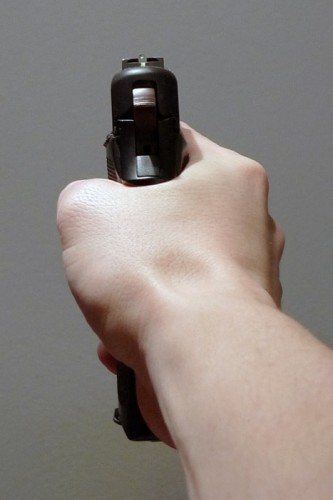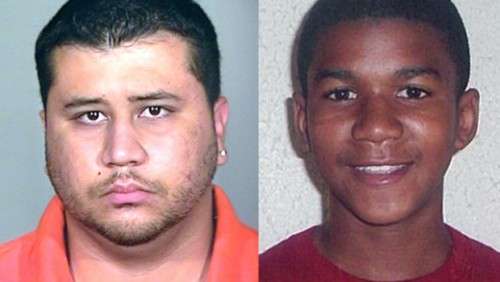Stand Your Ground: A Needed Law or a Justification for Violence?
On the night of February 26, 2012, in Sanford, FL, neighborhood watch coordinator George Zimmerman fatally shot Trayvon Martin. Before shooting the unarmed teenager, Zimmerman had called the Sanford Police Department from his car to report that Martin was acting suspiciously. While speaking to 911 dispatchers, Zimmerman left his vehicle and got into a physical altercation with Martin before shooting him in the chest from close range. In the days after the shooting, a media storm began to develop. Opponents of the shooting alleged that racial discrimination had played a role in the killing while supporters of Zimmerman insisted that he had acted in self-defense. Going along with this latter belief, the Sanford Police Department did not initially charge Zimmerman with any type of crime. Public outrage soon led to a special prosecutor being assigned to the case and, on April 11, 2012, Zimmerman was charged with murder in the second degree. While awaiting trial, Zimmerman has been released on a $1 million bond and is currently living in an undisclosed safe house in central Florida.
Beyond the debates that this case has started about race in America, another important component associated with this story has to do with self-defense and the laws that are meant to protect it. Currently, about half of the states in the U.S. have what are commonly referred to as Stand Your Ground (SYG) laws. Originating in Florida in 2005, SYG laws were created so that individuals would have a legal right to use force to defend themselves outside of their homes without having to retreat when they have a reasonable reason to feel threatened. These laws are extensions of the so-called Castle Doctrine which permits a person to defend his or her home with force. Florida’s version of the Stand Your Ground law justifies meeting force with force by citizens who (1) are not engaged in any unlawful activity and (2) are attacked at any place outside their home where they have a right to be as long as using such force is reasonably thought to prevent injury or death of innocent parties and/or to prevent the commission of a forcible felony. Similar laws are now found across the country.
But, are these laws really necessary? According to law professor Gregory O’Meara, they are not. He claims that criminal statutes are already designed to protect those who defend themselves or others. In order to successfully claim self-defense, O’Meara points out that a person (a defender) under unlawful attack needs to prove that (1) he or someone else was in danger of losing their life, that (2) the forceful action taken by the defender was necessary, and that (3) this force was used only to prevent or end the unlawful attack. If these requirements are met, then the defender should be found not guilty. Since Stand Your Ground laws are looser on these requirements, especially when it comes to acting reasonably, O’Meara notes that these laws “may provide a rock-solid defense to paranoid or dangerously aggressive people who are armed with deadly force.”
Conversely, proponents of SYG laws have a different take. Dennis K. Baxley of the Florida House of Representatives argues, for instance, that Stand Your Ground laws merely allow would-be victims to legally use force to defend themselves. The primary sponsor of the law in the Florida House, Baxley explains that the need for SYG laws originated after a case following Hurricane Katrina involving a property owner who fatally shot an intruder. These laws, Baxley insists, protect law-abiding citizens by confirming their right to self-defense without having to retreat and withouth having to worry about any civil or criminal repercussions for their actions.
A relatively new type of law, only time will tell whether SYG laws are good, bad, or somewhere in between. Preliminary research suggests, however, that these laws may do more harm than good. McClellan and Tekin (2012) found, for example, that SYG laws are related to a significant rise in the number of homicides, especially in regards to the killing of white males. These researchers blame the increased number of homicides on the “no duty to retreat” clause found in many SYG laws. Similarly, an analysis of the law in Florida by the Tampa Bay Times found that justifiable homicides tripled between 2005 and 2010. Yet, supporters of these laws are quick to point out that SYG laws are needed since they guarantee law-abiding citizens the right to forcefully defend themselves and since these laws may deter would-be criminals. Either way, Stand Your Ground laws are likely to become even more polarizing in the years to come, especially when it comes to cases like the one involving George Zimmerman. In regards to that case, Zimmerman’s attorney recently announced that his client will opt for a self-defense argument rather than using Stand Your Ground as a legal defense. Still, no matter the result of that case or the defense used, it seems highly likely that the debate surrounding Stand Your Ground is just beginning.
Further Reading:








I see four main points in opposition to SYG. 1) SYG has significantly loosened requirements to prove lawful self-defense. 2) Justifiable homicides have increased since the law’s adoption. 3) SYG isn’t necessary. 4) SYG is a new concept. I will address each one of these in turn.
First, has the SYG law significantly loosened requirements to prove lawful self-defense? In order to verify this claim, we can compare the relevant statutes both before and after enactment of the law. The SYG law actually comprised several statutory elements, including what is commonly referred to as the Castle Doctrine. In current statutes, SYG is incorporated into §776.013 Florida Statutes. The applicable text from current statute reads: “A person who is not engaged in an unlawful activity and who is attacked in any other place where he or she has a right to be has no duty to retreat and has the right to stand his or her ground and meet force with force, including deadly force if he or she reasonably believes it is necessary to do so to prevent death or great bodily harm to himself or herself or another or to prevent the commission of a forcible felony.” In 2004, the year before SYG was enacted, the applicable text was contained in §776.012 Florida Statutes. The text reads: “A person is justified in the use of force, except deadly force, against another when and to the extent that the person reasonably believes that such conduct is necessary to defend himself or herself or another against such other’s imminent use of unlawful force. However, the person is justified in the use of deadly force only if he or she reasonably believes that such force is necessary to prevent imminent death or great bodily harm to himself or herself or another or to prevent the imminent commission of a forcible felony.” The elements of justification to lawfully use deadly force are identical. Therefore the contention that SYG significantly loosened the requirements to justify use of deadly force is false.
Next, has the enactment of SYG been the cause of an increase in justifiable homicides? Indeed justifiable homicides increased, however that increase occurred in 2007, over a full year after the enactment of SYG. According to FDLE data, there was a corresponding increase in justifiable homicides by police at the same time as civilians. For example, in 2006 there were 12 justifiable homicides by civilians and 21 by police. The next year, 2007, there were 42 by civilians and 60 by police. The increases are 250% and 185% respectively. If SYG were to blame, why did justifiable homicides by police increase at almost the same rate and at the same time? This new level of rates has remained relatively consistent for both civilians and police in subsequent years.
Is SYG necessary? As previously mentioned, SYG comprised several statutory elements. One of these elements is found in §776.032 Florida Statutes, immunity from criminal prosecution and civil liability for Justifiable use of force. This is perhaps the most maligned element since the Zimmerman-Martin event. Much ado has been made about Zimmerman’s not having been immediately arrested and jailed. But one falsehood that has been repeatedly bandied about is the is somehow amounts to a “get out of jail free card”. Simply untrue. In any criminal accusation, police must establish probable cause that a crime had been committed in order to effect an arrest. Since a justifiable homicide is not, by definition, a crime, police must have evidence to refute a claim of justifiable homicide. In the case of Zimmerman, this evidence simply did not exist, therefore Zimmerman was not arrested. However the investigation, which is the same whether or not the shooter is free or in jail, continues exactly the same way, using the same methodology. At any time should evidence be discovered which refutes the claim of self-defense, the shooter can and will be arrested. The Zimmerman case aside, what if it were a clear-cut self-defense case? Should a person who was forced to defend their own life sit in jail until trial, just to have a jury throw out the case? For those who think so, I suggest you look at the case of Jay Lewis in Des Moines, Iowa. Mr. Lewis was attacked in a road rage incident by a convicted felon and an accomplice. He shot the felon, and was arrested. During the 112 days he sat in jail awaiting trial, he lost his job at the IRS, was evicted from his apartment and lost all the contents including furniture, clothing, appliances, and electronics which were set at the curb by the landlord. The jury, upon hearing the evidence, acquitted Mr. Lewis stating the case should never have been prosecuted. Too late for Mr. Lewis, however. He spent some time homeless after being released. There is NO REASON someone who is simply trying to stay alive in the face of an attack should be subjected to losing everything.
Finally, is SYG a new law. Law? Yes. However the concept of standing one’s ground in an attack is more than 100 years old in American Supreme Court jurisprudence. In years past, standing one’s ground was expected as a normal course of self-defense. It is only in recent years that the courts have entertained a notion that one should be required to flee. In the 1895 case of Beard v. United States, Justice Harlan for the majority stated, “The defendant was where he had the right to be, when the deceased advanced upon him in a threatening manner, and with a deadly weapon; and if the accused did not provoke the assault and had at the time reasonable grounds to believe and in good faith believed, that the deceased intended to take his life or do him great bodily harm, he was not obliged to retreat, nor to consider whether he could safely retreat, but was entitled to stand his ground and meet any attack made upon him with a deadly weapon, in such way and with such force as, under all the circumstances, he, at the moment, honestly believed, and had reasonable grounds to believe, was necessary to save his own life or to protect himself from great bodily injury.” Later, in the 1921 case of Brown v. United States, Justice Holmes was even more succinct when he stated, “Detached reflection cannot be demanded in the presence of an uplifted knife.”
Thank you for your input, Rich. The points you make are very thought provoking.